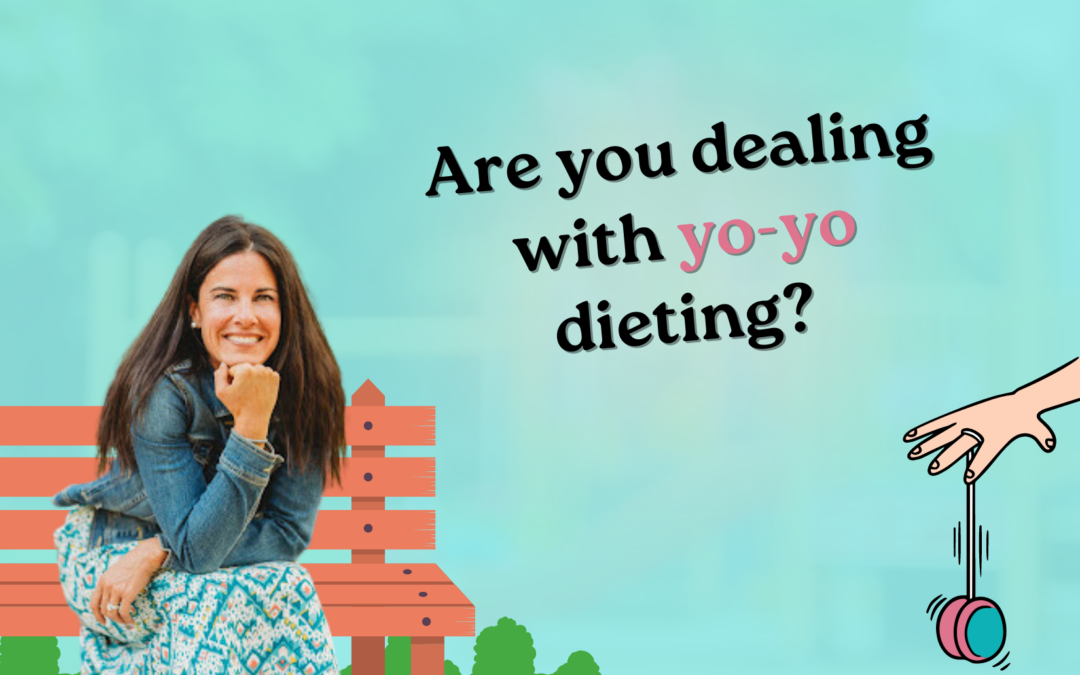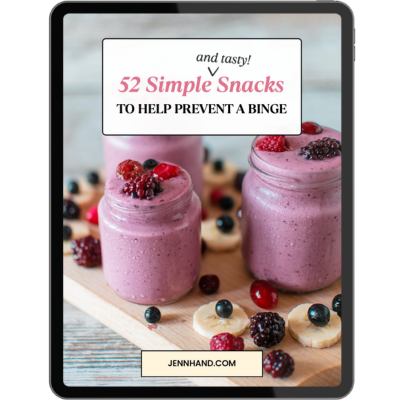Written by Jenn Hand, Holistic Nutritionist, Board Certified Health Coach, NBC-HWC
“Just this ONE last time. I’ll go back on Weight Watchers one more time, and that’s it!”
This was me, making promises to myself right before I moved from Philly to Colorado.
It was 2011, and I’d already spent many years in the diet and overeating cycle, and I thought losing weight before I moved to a new city would be a great way for a fresh start.
I lasted 1.5 days on Weight Watchers, counting points and measuring what I was eating, before I fell off the wagon, which led to eating all my forbidden foods and swearing off dieting forever.
And it actually stuck. That was the last time I went on a diet.
I battled yo-yo dieting on and off for 13+ years before I finally cracked the code.
Even though diets seem like the only way to “solve” a weight problem, deep down, we know that it doesn’t give us what we want long term. We may want weight loss, but we also want to feel freedom and peace around food. While diets never bring us that deep sense of balance around food, we can easily get tempted to go back on them when nothing else seems to work.
Despite what the dieting world tells you (that you can’t be trusted and you need to follow a rigid plan), you CAN find a comfortable weight without going on a restrictive diet. I’ll share more of my story below and what helped me most to break out of the yo-yo dieting cycle.
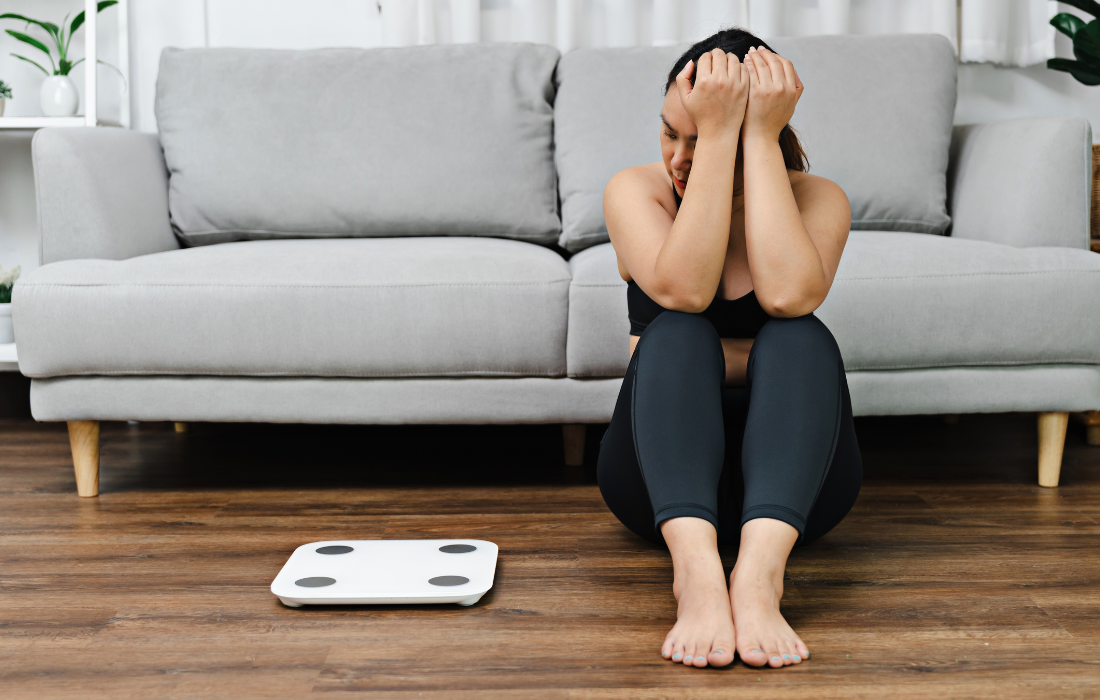
What Exactly Is Yo-Yo Dieting?
Yo-yo dieting is a cycle of gaining and losing weight.
It is a term used to describe the pattern of beginning a diet, losing the weight, going “off” the plan, not being able to sustain the weight loss, regaining the weight, then attempting to go back “on” a diet. In my 13+ years of battling with food, I was stuck in this yo-yo dieting cycle.
I would have “success” on a diet, but would gain the weight back, plus some, once I went off. No diet I ever did was sustainable, but after gaining the weight back, I’d feel like an utter failure, and would desperately try to start the diet that had given me “success.”
In the beginning, I could last months on a diet. But over time, I started to fall off the wagon faster, and my dieting “success” lasted only weeks or days.
Table of Contents
- My Dieting Story (and How I Stopped Yo-yo Dieting for Good!)
- Impact of Yo-Yo Dieting on Your Health and Mental Wellbeing
- Dangers of Yo-Yo Dieting
- What You Need to Know About the Yo-Yo Dieting Pattern
- Why It’s Not Uncommon for Women to Become Yo-Yo Dieters
- Why Dieting is a Vicious Cycle
- How Dieting Can Amplify Hunger
- Mental Toll of Dieting
- The Role of Stress in Yo-Yo Dieting-Related Weight Gain
- Yo-Yo Dieting Can Be a Precursor to Binge Eating
- So, What the Heck Can You Do Instead of Yo-Yo Dieting?
- What about Holistic Weight Loss…Does It Really Work?
- Changing Your Perspective to End Yo-Yo Dieting
- Setting Realistic Goals for Holistic Weight Loss (or No Goals at All!)
- Start Working with a Food Coach, Holistic Nutritionist or Holistic Weight Loss Coach
- Common Questions about Yo-Yo Dieting
My Dieting Story (and How I Stopped Yo-yo Dieting for Good!)
I’ve been on exactly 116 diets (and yes, I counted!) Sometime in high school, I gained some weight and became really uncomfortable in my body. I wanted to be thinner, I wanted to feel at ease in myself, and I wanted the insecurity I felt deep inside to go away.
On a whim, I decided to buy diet pills, eat nothing but peppers, ranch and some pretzels, and lose weight for the upcoming school prom. I lost about 25 pounds in 2 months, and everyone complimented me on how great I looked. And so began the overeating and dieting cycle, the diet pill addiction, and the attempts to fix my weight via dieting.
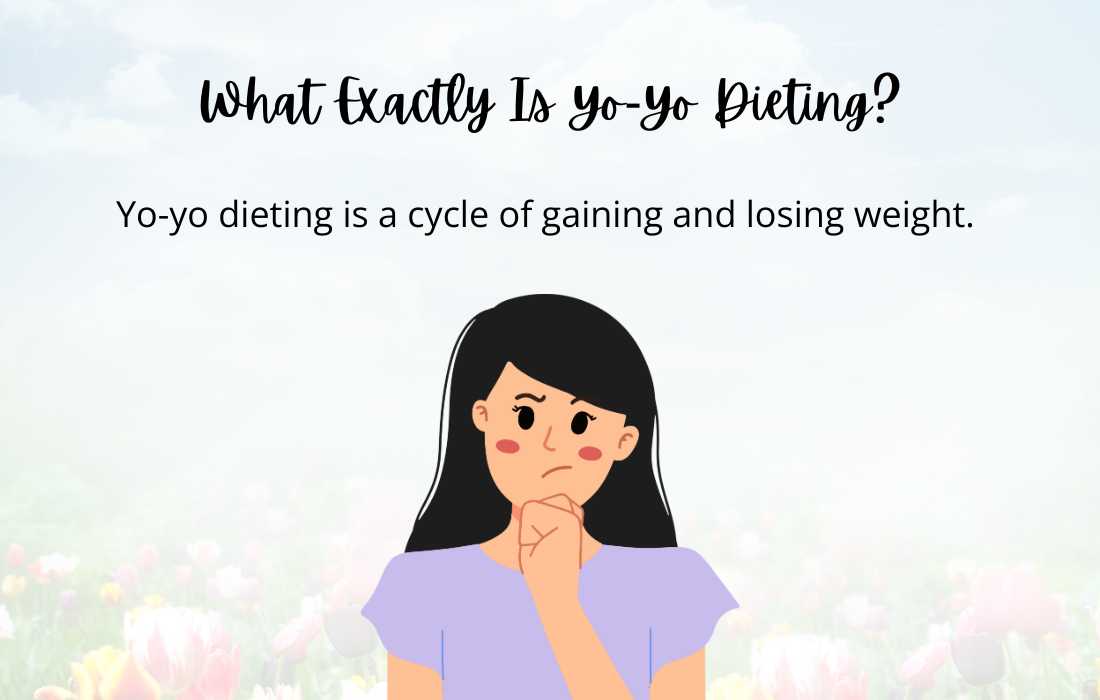
My whole life revolved around food: thinking about not eating, debating what I was going to eat, struggling with what I couldn’t eat and deciding how I would exercise to work off the food I did eat. I tried Atkins, Jenny Craig, Weight Watchers, Paleo, calorie counting, shakes, the Mediterranean diet and anything else that promised weight loss. I also attempted the Hollywood diet, various cleanses, and other restrictive food plans masked as “lifestyle changes.”
Over time, I began to realize diets didn’t work.
This wasn’t an all-at-once realization, but a slow, steady shift over many years. As I traveled through the endless maze of starting new diets, I lasted less and less time on each of them. Months became weeks, weeks became days. My very last diet was a final attempt at Weight Watchers that lasted 1.5 days.
What helped me shift out of dieting for good was getting professional help and working through all of the food related issues.
I began eating more regularly and often, I started learning how to listen, hear and honor my body. I dug into the emotions that were sending me to the food and began practicing how to cope with feelings rather than eat over them. I questioned all of the food rules I had and worked to know my own body’s needs. I dove deep into nourishment and self-care, body image and my mental tapes that kept me stuck.
After overcoming my own yo-yo dieting, I studied nutrition, became a health coach, and for the past ten years I’ve been helping women overcome bingeing and restricting, and letting go of dieting. I’ve worked with 1000s of women, so I’ve heard about almost every iteration imaginable of the yo-yo diet cycle.
So let’s get into the impacts of yo-yo dieting and how to recover from it.

Impact of Yo-Yo Dieting on Your Health and Mental Wellbeing
One of the biggest impacts on my psyche when I was trapped in the diet cycle was the feeling of failure.
I blamed myself for not being able to stick to a diet. I got angry and frustrated, thinking there was something wrong with ME. Over and over, I blamed myself and spiraled deeper into feelings of blame, guilt and depression.
This cycle can have a significant impact on physical and mental health. Physically, being in the weight gain/weight loss cycle can affect metabolism, gut health and possibly lead to an increased likelihood of developing diabetes.
For me in my own journey, I felt like my body was super out of whack in my dieting years.
My digestion was irregular, my skin broke out a lot, and I was super moody, many times because my blood sugar was so low, since I was attempting to “stick to” something!
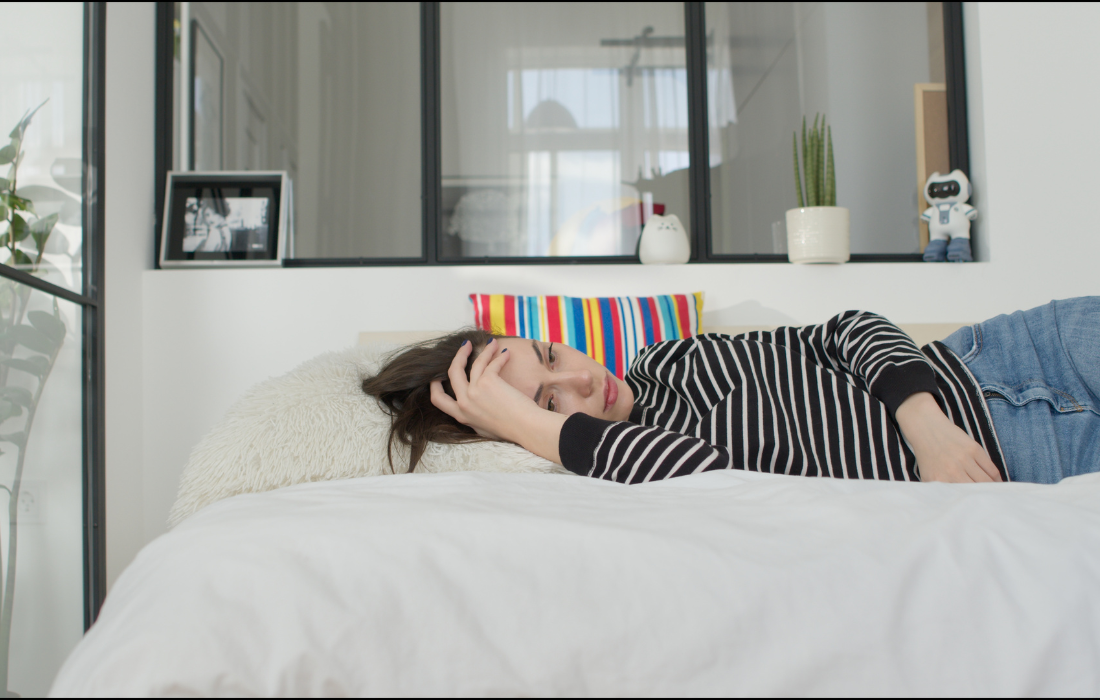
Dangers of Yo-Yo Dieting
Over time, dieting can have a great impact on our health. In a 2021 research study that included over 250,000 people, it was found that individuals who experienced weight cycling had a 23% increased risk of developing diabetes compared to those who didn’t weight cycle. Yo-yo dieting is a very common behavior that can lead to losing/gaining weight. Other researchers at Columbia University found that yo-yo dieters were also 82% less likely to have a BMI in the healthy range. This isn’t surprising, as I battled my weight the most when I was stuck in the cycle.
While this can be scary, there is another way!
All of my blogs and podcasts are to help you break out of this cycle so you don’t spend your life frustrated and stuck. So have no fear, as I am here to support you.

What You Need to Know About the Yo-Yo Dieting Pattern
Looking back on my diet cycle battle, here are a few things I would tell my younger self about dieting:
- At first, it can seem easy to lose weight with a diet & “success” is quick in the beginning).
- Over time, the body begins to rebel against dieting. It becomes harder and harder to “stick with” something.
- This cycle makes it harder to lose weight and keep it off long term.
- There will always be an “off” if you go “on” something.
- Dieting never leads to what it is we really want: freedom and peace around food.
Towards the end of my battle to stop dieting, I couldn’t last more than a few days on a diet. I’d desperately try to “get back to” the plan I’d followed before, but my body had had enough! Dieting can be very tempting, as it seems like the only solution to our weight woes. But the cycle can lead to long term implications, physically and emotionally, so it can be helpful to work to break free and learn to find more balance!
Why It’s Not Uncommon for Women to Become Yo-Yo Dieters
Women can have a complicated relationship with food. Typically, women struggle more with using food for emotional reasons than men do.
Emotionally eating can have a big impact on how we eat, and can lead to more extreme promises related to food.
Let’s say I have a majorly stressful day at work. I come home, the house is a mess, the kids are running around screaming, no one cooked dinner and there are still 120 things on my to-do list. I’m overwhelmed, irritated, frustrated and want to melt away into the background where no one needs me. But I have to start on dinner, make sure the kids do their homework, and find some time to clean up the mess.
As I’m cooking dinner, I open a bag of chips to relieve some of the stress. I end up eating the whole bag, pick at dinner, and once the kids are in bed, binge on 4 bowls of ice cream.
I get super mad at myself since I know I “shouldn’t” have eaten all of that crap, so I promise myself I’ll be good and start back on my diet tomorrow.
This cycle then ebbs and flows, with me turning to food for reasons other than hunger. While not all women emotionally eat, most of us do, as we typically manage work, kids (or pets), the house, and all of life’s “admin” things.
This has a big impact on why we end up being stuck in the diet cycle!
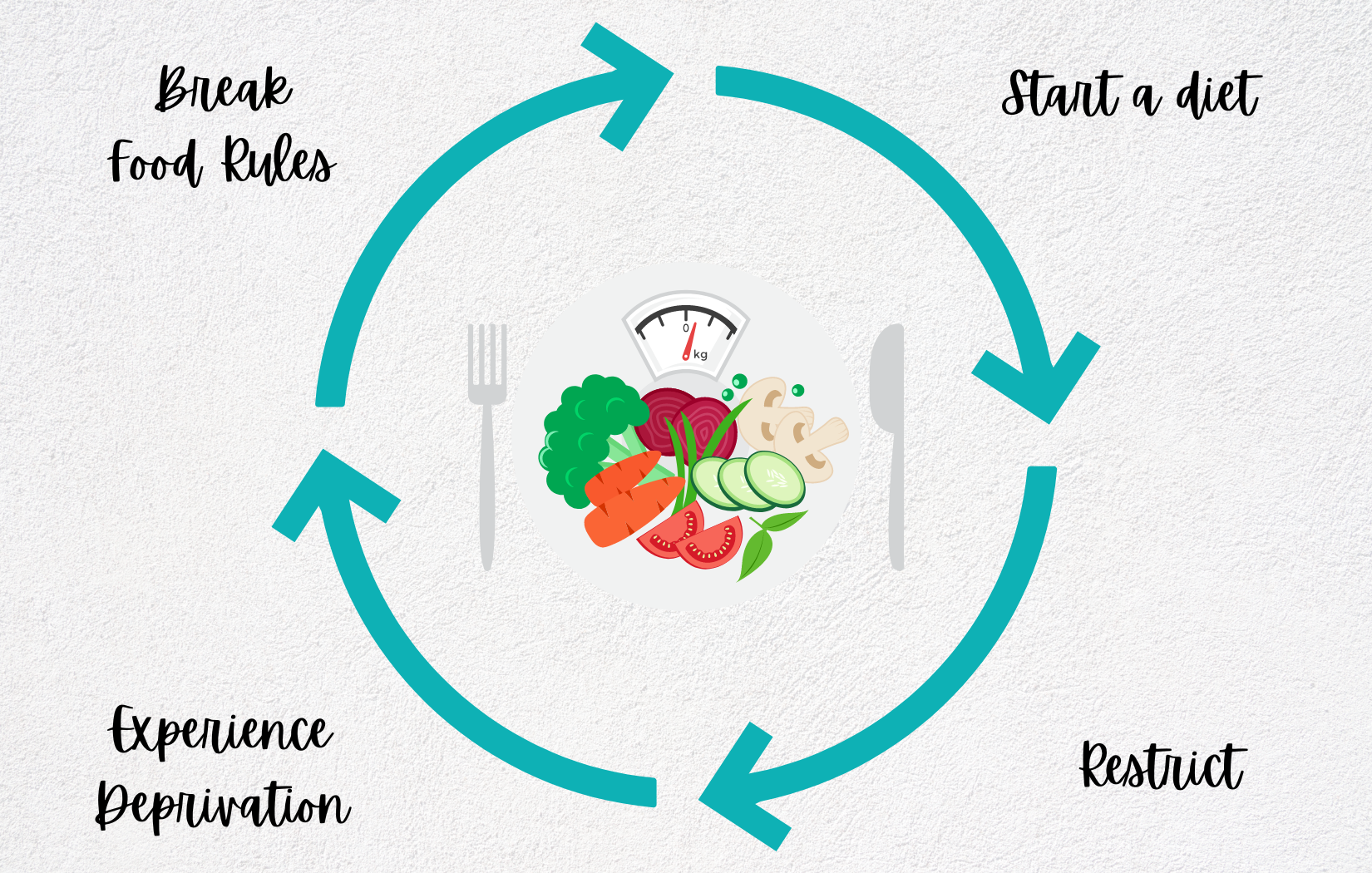
Why Dieting is a Vicious Cycle
Dieting can be a vicious cycle of:
- Temptation (to start a program or plan)
- Hope (that this will be the one thing that changes your weight for good)
- Failure (when you inevitably fall off the wagon)
- Blame (blaming yourself for not having enough willpower)
- Temptation (the cycle starts over)
After years of my own struggle and thousands of hours coaching other women, I created what I call the “Law of Dieting.” For every equal and opposite diet, there is a binge.
When you go on something, you inevitably fall off. It’s the nature of the cycle. Even though we blame ourselves, failure is built into the cycle. You can’t stay on something that’s unsustainable forever, so at some point in the dieting process, you have to stop. And when this happens, we often blame ourselves for not having enough willpower, when in reality, it’s not our fault at all! It’s the nature of being in the diet cycle.
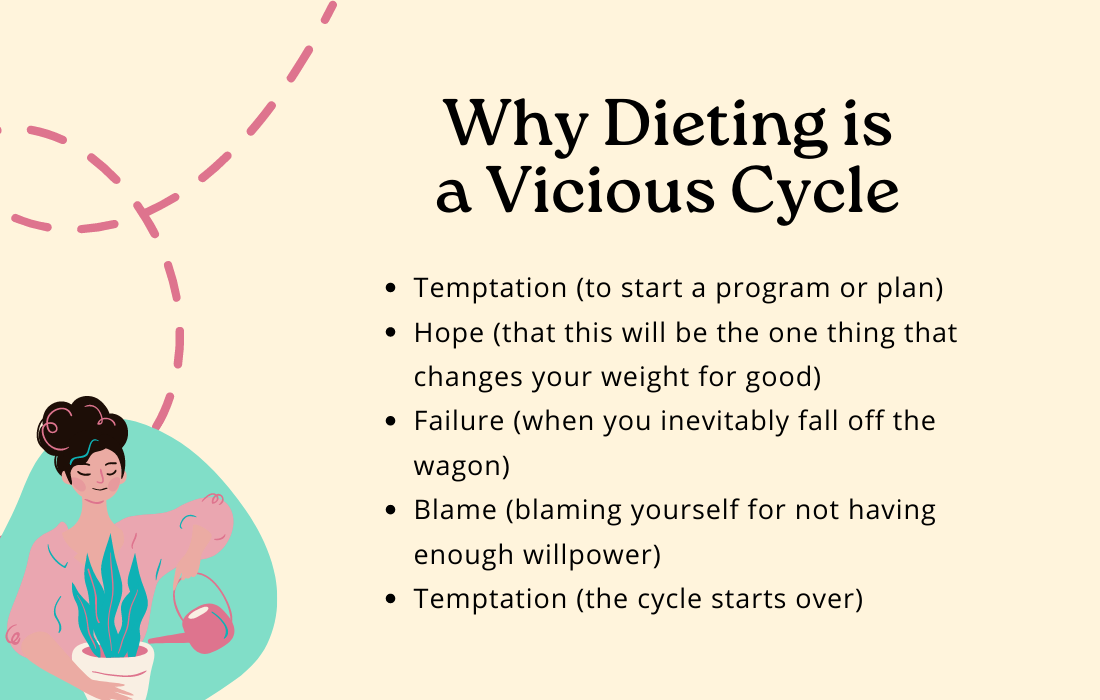
How Dieting Can Amplify Hunger
When we’re on a diet, we’re usually trying to eat as little as possible or go as long as we can without eating.
But the “less is better” mentality can actually amplify hunger!
When we’re not getting enough fuel, our body goes into conservation mode. It will hold on to the fuel we do get, in fear that the body will need to use it because it won’t get any more. We end up being hungrier overall, as our body is trying to tell us to eat more.
With dieting, our blood sugar can have greater highs and lows, and when we hit that low place, we crave anything quick-digesting, usually something sugary or with carbs. So if you’ve ever dieted and actually been hungrier, there’s nothing “wrong” with you; it’s simply your body responding physiologically to what’s happening!
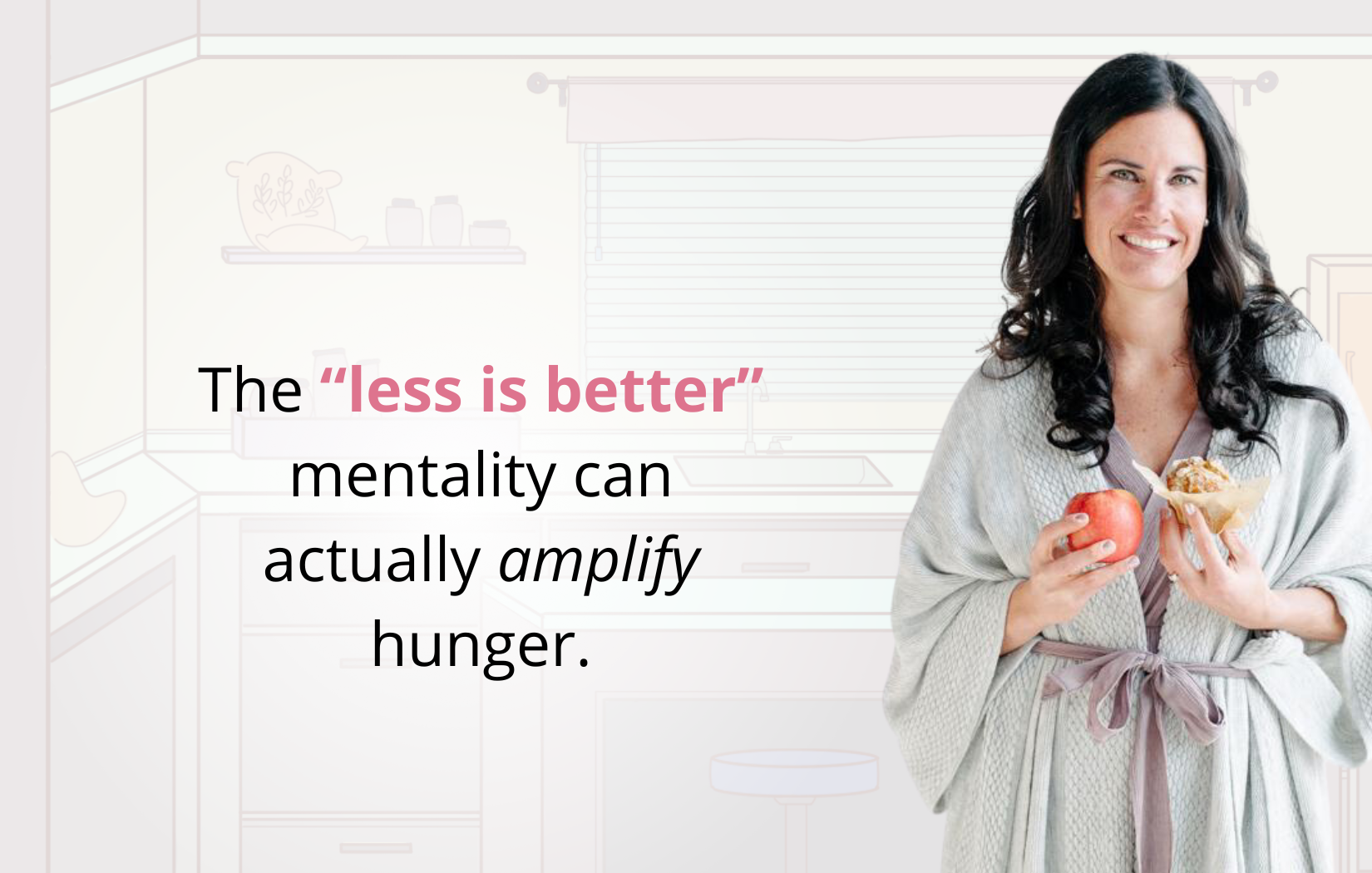
Mental Toll of Dieting
The biggest toll dieting took on me was the mental aspect.
Whenever I fell off the wagon, I’d feel like an utter failure, blame myself, convince myself I’d never be able to lose weight, and spiral into a dark place. Chronic dieting also has other mental health implications and can lead to an increase in anxiety and depression, fatigue, deep guilt, and feelings of failure.
The Role of Stress in Yo-Yo Dieting-Related Weight Gain
Stress can wreck a lot of havoc in our desire for weight loss.
When our bodies are stressed, they secrete a hormone called cortisol. Cortisol puts our bodies in flight or flight, and over time, can lead to increased cravings for salty, sweety and fatty foods. This can negatively impact our weight struggles, as when we are stressed, it can be more challenging to make nourishing choices due to physiological cravings from our bodies. Learning to cope with stress and deal with feelings in a healthy way can be a huge help in minimizing the impact of stress!
Yo-Yo Dieting Can Be a Precursor to Binge Eating
The Law of Dieting applies here. For every equal and opposite diet, there is a binge.
When we go “on” something, we will inevitably go “off.” While we think dieting is a way to control our food, it usually sends us into feeling more out of control, since it leads us to eating all the things we couldn’t eat on the diet. If you’re recovering from binge eating, please know that dieting can lead to a binge.
So, What the Heck Can You Do Instead of Yo-Yo Dieting?
When we’re stuck in the diet cycle, it can be challenging to see how else we might approach food.
During my years of dieting and overeating, I didn’t know there was another way. Dieting was just my normal. But there is another way! I teach women how to let go of the diet cycle and listen to their bodies. It can be called Intuitive Eating, but I take it even deeper.
Food and weight are multi-faceted. Even though we want it to be easy, our relationship to food can be quite complex.
Food is physical, mental, emotional and spiritual. Letting go of dieting involves learning how to listen to hunger and fullness, breaking out of food rules that no longer serve you, trusting yourself and your body around food, understanding what your body needs and how to take care of those needs, and learning how to stop emotionally eating (and cope with life without food).
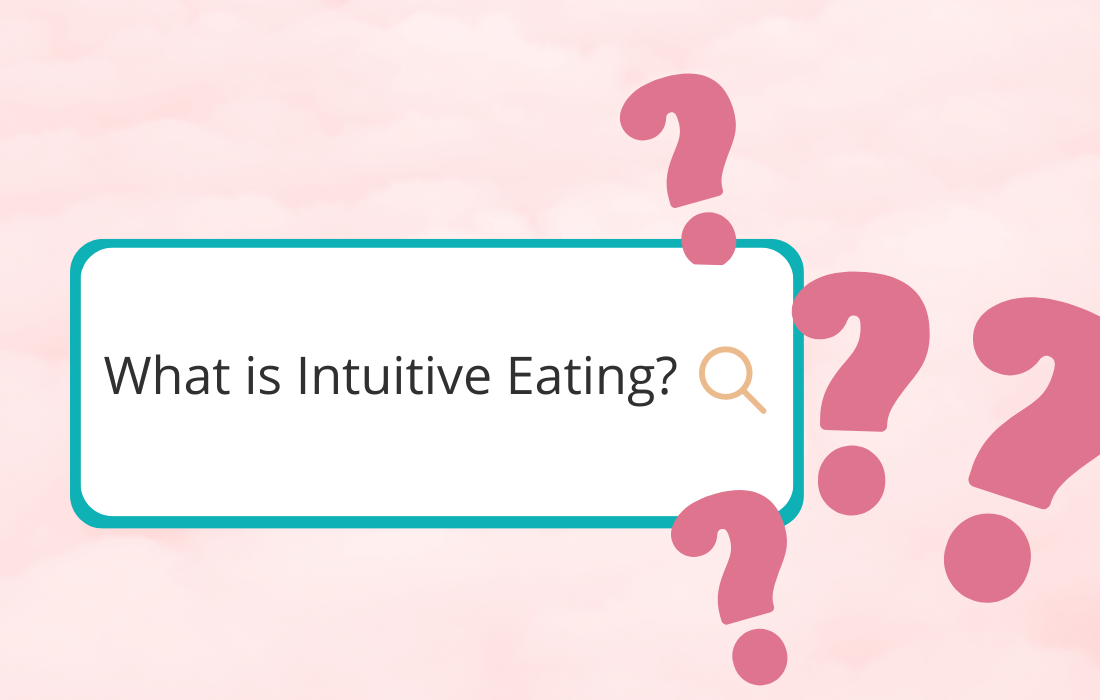
What about Holistic Weight Loss…Does It Really Work?
Usually we begin a diet because we want to lose weight. But we then run into the obstacle of not being able to keep the weight off long term! Enter holistic weight loss.
This is an approach that takes ALL of you into account: your physical, mental, emotional and spiritual self. Looking at weight in a new way allows you to achieve sustainable lasting weight loss.
Changing Your Perspective to End Yo-Yo Dieting
One of the big shifts in my own journey was learning to view dieting in a different way.
I took a deep look at how dieting impacted my life and my weight, and realized dieting didn’t actually work for me. Sure, dieting may have given me short term success. But when I took a look at what it was I really wanted, dieting didn’t truly give it to me. After every diet, I was left with a sense of “Well, now what…now how do I eat?”
After you stop the plan, what are you supposed to do?
I had a deep desire for peace and a sense of freedom around food. I wanted to be at a weight my body was comfortable at. And deep down, I wanted to just be, well, normal around food. Take a look at your own relationship to dieting and explore whether it’s given you what you really want around food. It can be helpful to begin to be open to other ways of viewing food, and not spending a lifetime in an endless diet cycle!
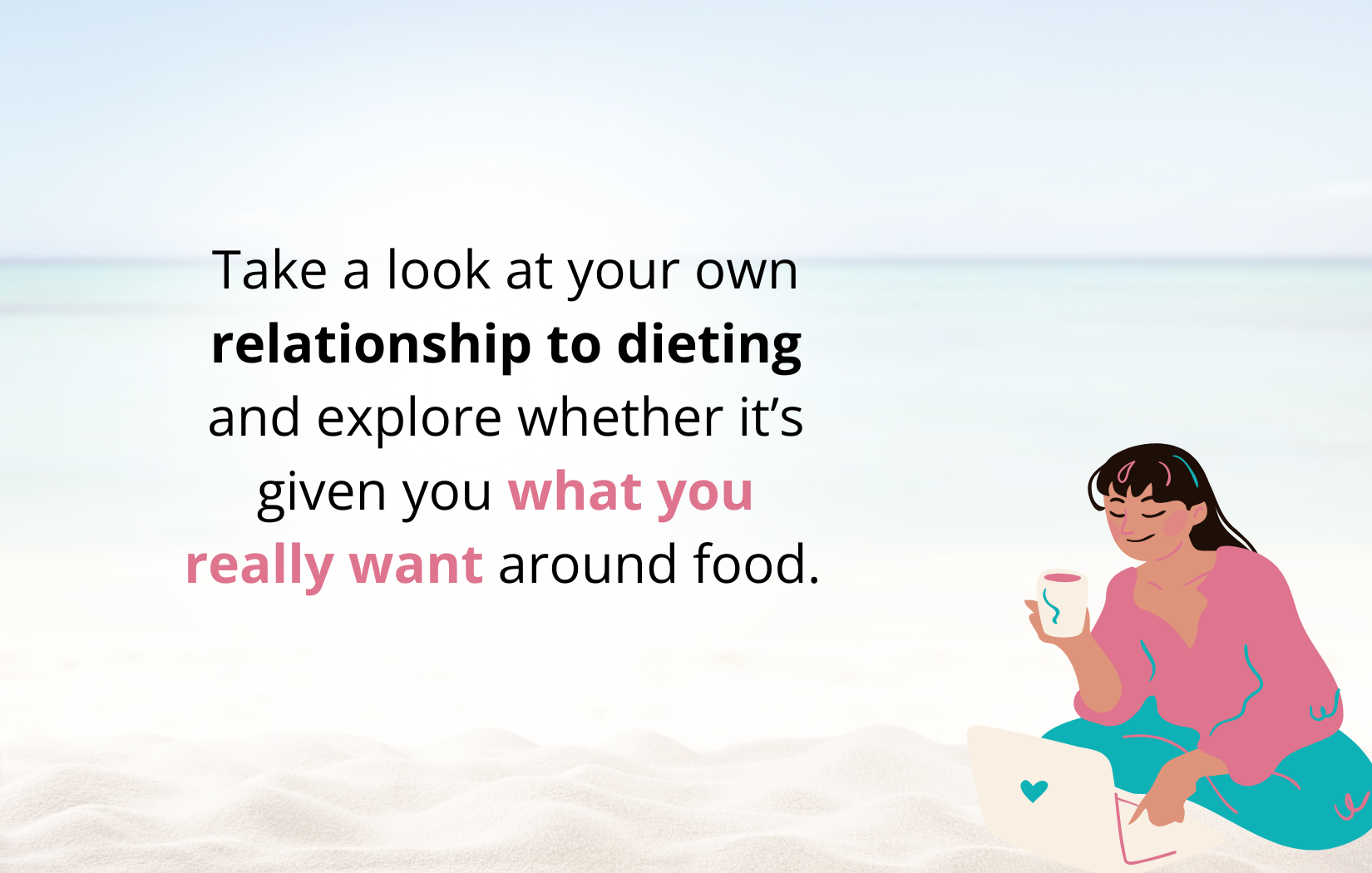
Setting Realistic Goals for Holistic Weight Loss (or No Goals at All!)
Being in the diet world can give us an unrealistic view of “results.” We expect to lose weight in a week, 10 days or a month. Usually, it’s a very short timeframe and we expect almost instant results. This sets us up for unrealistic expectations on our weight journey, as usually, what we do on a diet isn’t sustainable for the long term. Sustainable weight loss is a slow and steady process.
Especially if we battle food emotionally or mentally, it can take time to heal the habits and patterns that no longer serve us.
I like to view goals differently on this path: small wins add up to big changes.
We want BIG results, but often forget that those big changes happen with a lot of small steps along the way. Focusing on small, manageable changes over time can be helpful in looking at this process in a balanced way. You may not set any goals at all! There were many times on this path where I decided not to set specific goals when they got in the way of my own mental progress.
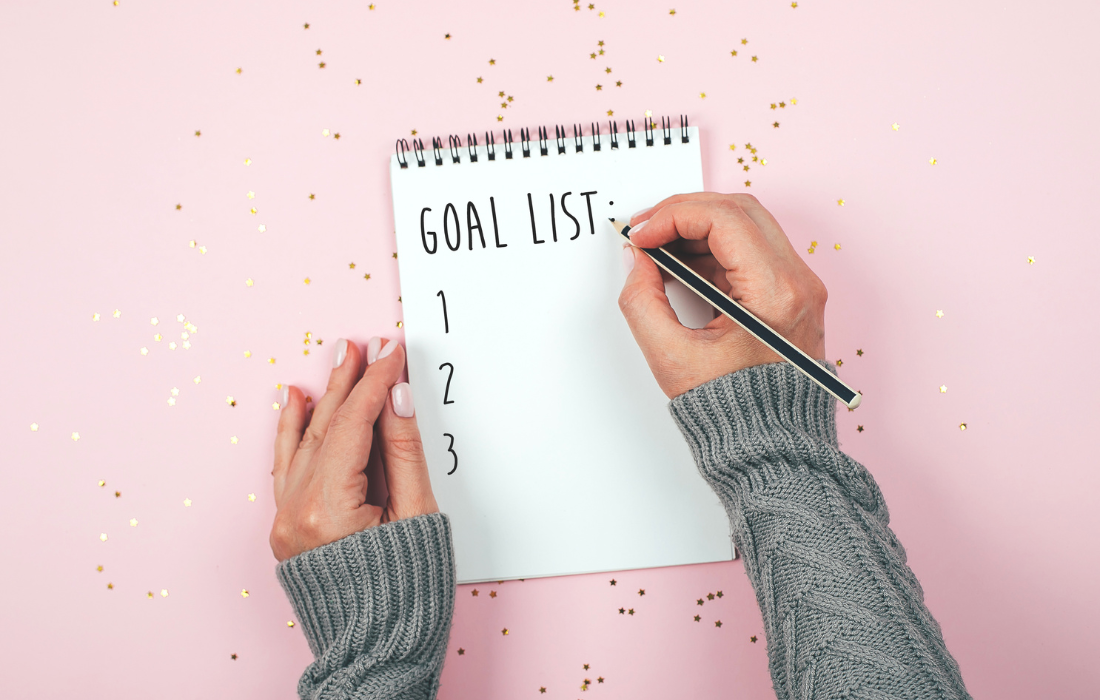
Start Working with a Food Coach, Holistic Nutritionist or Holistic Weight Loss Coach
There are many different types of support to help you create lasting, sustainable change if you are struggling.
Coaching can be a great way to get support. Although there are tons of different coaching specialties, it can be helpful to work with someone who has a background in what you’re struggling with. The woman I worked with many years ago understood exactly what I was going through, as she had lived the path herself.
When I confessed I’d taken 25 diet pills a day, had picked through the trash to get the last of the brownies, and had eaten the entire bowl of Halloween candy in secret, she didn’t bat an eye. She deeply understood my struggle, and it was immensely helpful to me as I healed.
Having someone know what you’re feeling, why you struggle with food, and have firsthand experience of what it takes to change can be life-changing on this path!
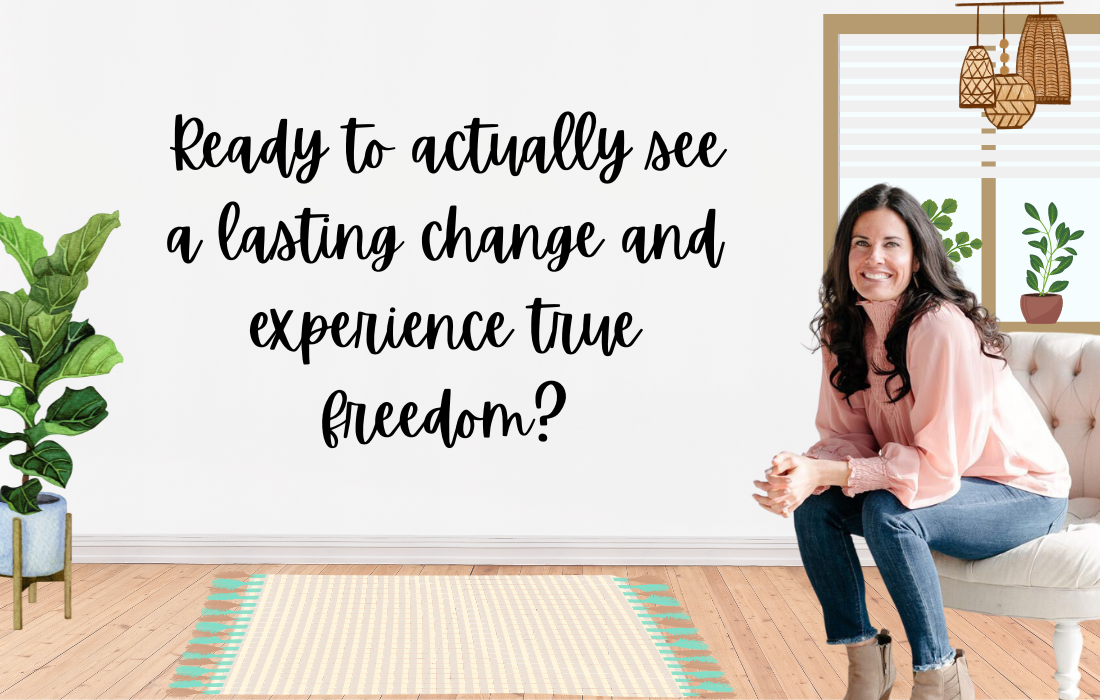
Common Questions about Yo-Yo Dieting
How can I lose weight after yo-yo dieting?
When you’re working to stop yo-yo dieting and lose weight, the best approach is a holistic healing of the physical, mental, emotional, and spiritual components of food.
What is considered yo-yo dieting?
Yo-yo dieting is the repeated gaining and losing of weight. It’s a term used to describe the cycle of starting a diet, losing weight, going off and regaining the weight, then attempting to start another diet.
Is yo-yo dieting good for you?
Yo-yo dieting can be detrimental not only to your physical health, but also to your mental and emotional well-being.
Why is yo-yo dieting bad for you?
Yo-yo dieting can lead to long term weight struggles and disordered eating. It can also impact gut health, metabolism, mental health, and lead to other health-related issues.
Why is it called yo-yo dieting?
It’s called yo-yo dieting because it typically resembles the up and down path of a yo-yo. We go on a diet, lose weight, go off, gain it all back, and get stuck in the yo-yo movement.
How does yo-yo dieting affect the liver?
Over time, yo-yo dieting can increase the likelihood of higher fat levels in the liver. The good news is that it can be healed through breaking out of the diet cycle and learning to find a healthy relationship with food.
Can you reverse the effects of yo-yo dieting?
You can definitely reverse the effects of yo-yo dieting through a steady process of working to heal your relationship to food and find your own version of balanced eating.
Is intermittent fasting a yo-yo diet?
Fasting is technically not a yo-yo diet, but for those who battle dieting and overeating, it’s not recommended, as it can lead to overeating post fasting.
More Related Articles
⚪ How to Get Off the Diet Roller Coaster
⚪ 7 Myths of Weight Loss
⚪ If You’re Not Dieting, How Will You Lose Weight?
⚪ How to Eat Healthy without Dieting
Get the Normal Eater’s Newsletter
Join 8000+ women who are overcoming overeating, binge eating, and breaking up with dieting forever. Get Jenn’s inspiring and actionable weekly newsletter with the latest posts, podcasts, and tips on how to love your body, find food freedom, and lose weight holistically.
Get the Normal Eater’s Newsletter
Work with an Emotional Eating & Holistic Nutrition Coach
Overcome Bingeing and Emotional Eating, and Break Up with Yo-yo Dieting
Working with an emotional eating coach and holistic nutritionist can help you get free from the frustrating binge and restrict cycle and stop yo-yo dieting.
You don’t have to be obsessed with food or have a million rules around eating to find your natural weight and learn to love your body. Ready to actually see a lasting change and experience true freedom?
Schedule a 20-min CallAbout the Author:
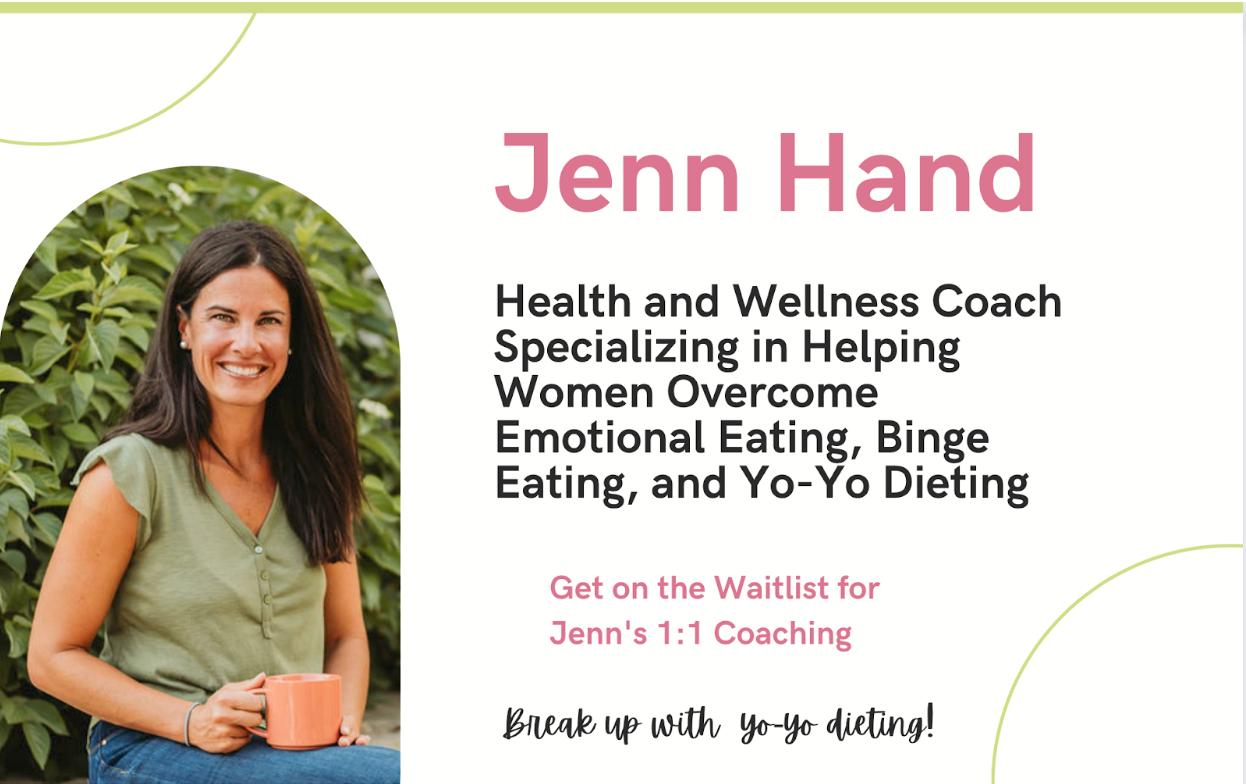
Jenn Hand has been helping women like you become normal eaters since 2015.
She’s worked with thousands of women, helping them to balance their bodies, end bingeing, stop obsessing over food, and start feeling amazing again. As a board-certified health coach and holistic nutritionist, Jenn knows how to support you in making real positive changes that last.
Her articles have been published on Mind Body Green, Tiny Buddha, Thrive Global and other local and global media platforms. She’s the author of How to Be a Normal Eater and the creator of The Normal Eater’s Club program. Listen to Jenn’s advice and tips on the Cake Doesn’t Count Podcast, or read more of her articles for free on the Food Freedom Blog.
Learn About Coaching!
